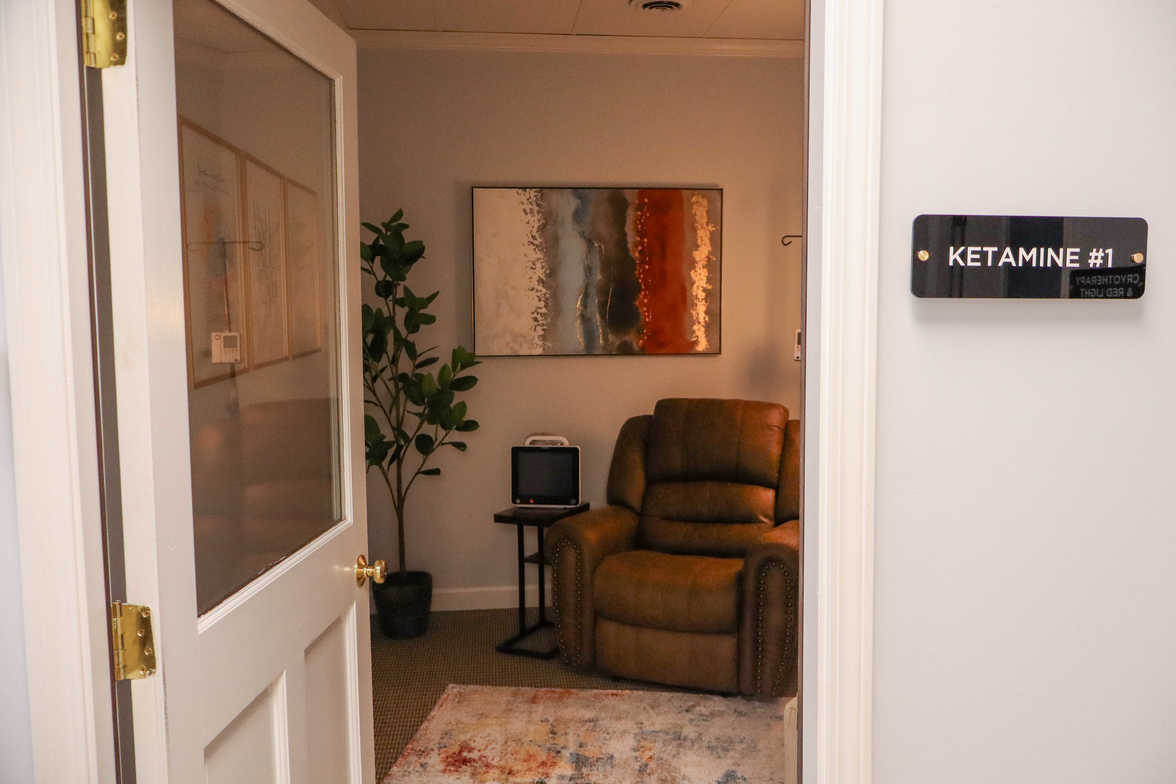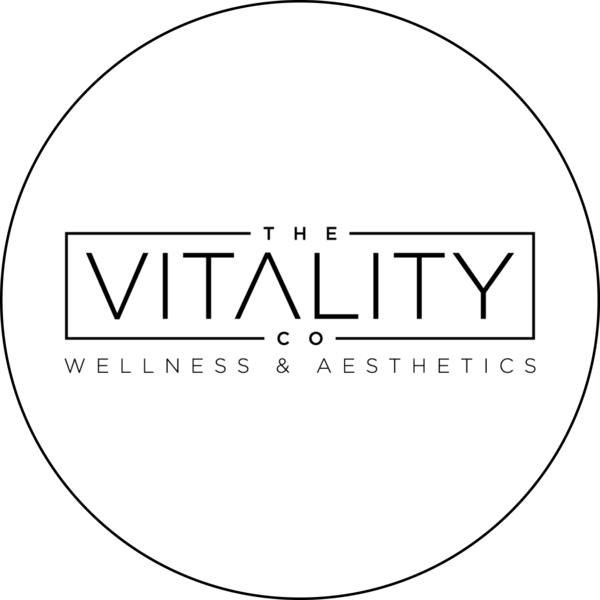Unlocking Healing with Ketamine
A transformative approach to mental wellness.
Ketamine Infusions at The Vitality Co. offer a pioneering path to mental health care, distinguishing itself by potentially providing relief where other treatments may not have. We are a referral based Ketamine infusion center. Ketamine has been shown to be highly effective in the resolution of symptoms experienced from treatment resistant depression, anxiety, PTSD, OCD, suicidal ideations and chronic pain. With a focus on safety and personalized care, we're here to explore how ketamine can contribute to your wellness journey, offering hope and a new perspective on health.
This appointment is for a FREE in-person consultation with the anesthesia provider that will be infusing the Ketamine. Once the in-person consultation is complete, your infusion appointments will be booked based off availability of our anesthesia provider. You must have a current diagnosis of treatment resistant depression, anxiety, OCD, suicidal ideations or chronic pain/CRPS to qualify for a Ketamine infusion.
What exactly is an infusion?
An infusion is the administration of intravenous (IV) Ketamine over a specific period of time. All mental health infusions are 40 minutes. Chronic pain infusions require a larger dose and are 2 hours.
How many infusions do I need?
The optimal regimen for ketamine therapy has not been established and may vary among individuals. We do know the following from various studies and from clinical experience:
1) Serial infusions have been shown to be more effective than single infusions;
2) Closely spacing infusions in the initial treatment phase (two to three infusions per week), then fine-tuning an individual's regimen with well-timed maintenance infusions, appears to confer the best hope of success. Typically we offer six infusions within a two-week period, with subsequent infusions as needed to relieve symptoms. Most patients require “maintenance” infusions every few weeks to months. The response of individual patients varies and is impossible to predict with current available resources. In keeping with the standards and best traditions of the practice of anesthesia, wherein each anesthetic plan is designed according to the particular needs of each patient, we are dedicated to getting to know each patient's needs and responses and tailoring therapy to the individual.
What side effects can I expect during and after an infusion? Will I be anesthetized/unconscious during the infusion? Will I be groggy afterward?
Responses to ketamine vary from individual to individual. You will be awake and most likely continue to be able to interact with those around you, listen to music, or just close your eyes and relax during the infusion. Some people may experience transient dizziness, nausea, mild visual hallucinations, a sense of disconnection from the body, and mild distortions of space and time perception. The infusion is generally a tolerable experience for most people, though is commonly described as "weird." It can also leave some people feeling emotionally raw or vulnerable, while others may feel a sense of well-being or openness. You will be back to your baseline about thirty minutes after the infusion ends and will be monitored for twenty to sixty minutes before you are discharged. Some people can become fatigued after infusions and/or may develop headache, a feeling of "heaviness," or some nausea. While you may not be groggy after the infusion, we require that you avoid driving, operating machinery, or participating in challenging mental work or decision-making for at least twelve hours after the infusion, and we require that someone drive you home.
Is ketamine dangerous?
Ketamine is an anesthetic that has been widely used for decades. It was synthesized by Calvin Stevens at Parke Davis Laboratories in 1962 and has been used as an anesthetic in both children and adults since the 1970’s. Ketamine has been used illegally under street names. The Vitality Co. does not endorse the recreational use of ketamine. Abuse of ketamine can be very dangerous and potentially lethal, as is the case with alcohol and narcotic medications. Ketamine is very safe in the hands of clinicians specially trained to provide it as an anesthetic or analgesic. In fact, many anesthesia providers will choose to use ketamine over other anesthetics its for safety profile. The dose used for treatment of depression are well below what anesthesia providers use to anesthetize patients for surgery.
Is there research to show that ketamine helps with depression?
Studies at the National Institutes of Mental Health, Mayo Clinic, Mt. Sinai School of Medicine, and Yale have shown significant benefit with the use of low-dose ketamine infusions for depression. We are happy to provide you with research showing the efficacy of Ketamine infusions for Depression, Anxiety, Bipolar Disorder, PTSD, and certain chronic pain syndromes.
Does ketamine help people with bipolar disorder? What about other psychiatric illnesses?
Research supports the use of ketamine for bipolar disorder. Various studies suggest it shows some promise for chronic posttraumatic stress disorder, obsessive-compulsive disorder, substance addiction, and even traumatic brain injury as well. It has also been used for chronic pain conditions such as CRPS. Its cognitive protection/ability to attenuate post-operative delirium has been observed by anesthesia providers for a number of years now and may hold promise for individuals with chronic conditions in which cognitive protection/synaptic regeneration is desirable (see "How does ketamine work?" below).
Ketamine is not useful and may in fact be harmful or exacerbate symptoms in schizophrenia. Its use for a variety of medical/neuropsychiatric problems has generated considerable interest and is being continually explored.
Will ketamine work for me? What is the success rate of ketamine infusions for depression?
Ketamine has shown significant promise in the studies that have been published within the last eight to ten years. On average, three out of four people experience some benefit from ketamine treatment for depression. It is important to remember that ketamine may produce no improvement in some, and in a small subset of patients may even worsen symptoms. Your response to ketamine cannot be predicted with our current resources. There may be certain elements of your health history that may affect your body's ability to respond well to ketamine. Practitioners across the country are reporting positive results for their patients. For a list of ketamine infusion providers in the U.S., please see the directory on the Ketamine Advocacy Network website.
If I do respond to ketamine, how quickly will it work, and how long will relief last?
Some patients begin to feel a difference by the evening or day after their first infusion. Even for "responders," periods of sadness or depressed mood may still occur between infusions, but the overall trajectory of mood symptoms should be one of improvement. Responders may also find urges to self harm and suicidal thoughts diminished and ability to cope with stress improved. Patients may find that functional improvements - getting a to-do list done, socializing more easily, etc. - occur before improvements in mood. Family and friends thus
sometimes observe that a patient "seems better" even though the patient still feels the same. Changes can be gradual. Some patients find that the positive effects of ketamine may wear off with time. There is research to suggest that in order for the effects of ketamine to be sustained, a maintenance regimen is advisable. The response of individual patients varies. There have been rare cases of remission after ketamine infusion therapy, but these should be considered the exception rather than the norm. Ketamine should not at this time be thought of as a cure for depression but rather as an adjunct to ongoing treatment that can help reset a person's baseline, relieve some of the suffering and hopelessness of major depression, and give other therapies such as oral medication and psychotherapy a chance to progress.

How does ketamine work?
Ketamine's anesthetic effects are mediated by interactions with a member of the glutamate receptor family, the NMDA receptor. It interacts with other receptors as well, including
• opioid receptors;
• dopamine receptors - it appears to reduce dopamine deficits in a brain circuit involving the hippocampus and the nucleus accumbens; and
• a receptor known as the AMPA receptor, thought to be an important component of its antidepressant effects.
Rather than targeting neurotransmitters in the brain, ketamine is thought to target gene expression and protein manufacture in certain important brain pathways or circuits. It rapidly activates a biochemical pathway associated with synaptic plasticity, the mTOR pathway, by increasing expression of a gene encoding the protein BDNF, which gets the m-TOR pathway going. Activation of the protein-making machinery of this pathway in brain cells leads to an increased number of new synapses in the prefrontal cortex and the increased formation of synaptic signaling proteins. Put simply, ketamine appears to restore brain synapses, both structurally and functionally, that have been damaged by the disease of depression. Ketamine hydrochloride is a nonbarbiturate dissociative anesthetic. As a cyclohexanone derivative, the drug rapidly acts and produces profound anesthesia and analgesia. Its chemical name is ±)-2-(o-chlorophenyl)-2-(methylamino) cyclohexanone hydrochloride; the structural formula is CHClNO. Ketamine is a noncompetitive N-methyl-D-aspartate (NMDA) and glutamate receptor antagonist that blocks HCN1 receptors. The unique dissociative action and partial agonism of opiate mu-receptors permit painful procedures in a consistent state of sedation and comfort.
Ketamine's efficacy in chronic pain as an antidepressant far outlast the actual drug concentrations and is possibly mediated by a secondary increase in structural synaptic connectivity mediated by a neuronal response to the ketamine-induced "hyper-glutamatergic state." The N-methyl-D-aspartate (NMDA) receptor has a significant role in the etiology of depression. Ketamine, through its NMDA antagonistic action, works rapidly in controlling symptoms of depression and acute suicidal ideation. Ketamine can elevate the levels of glutamate in the brain, stimulating synaptogenesis and elevated levels of brain-derived neurotrophic factor (BDNF). Ketamine may interact with the sigma receptors. It works by decreasing central sensitization, wind-up phenomenon (development of ongoing, worsening, or chronic pain), and pain memory. Cholinergic, monoaminergic, and opioid systems seem to play both a positive and negative modulatory function in both analgesia and sedation. Ketamine reverses tolerance to opioids. Ketamine generally maintains normal pharyngeal and laryngeal reflexes and permits spontaneous respiration. It enhances or maintains normal skeletal muscle tone and is associated with cardiovascular and respiratory stimulation. These characteristics make it particularly useful in the emergency department for short-term procedures, especially if a patient is unprepared for an emergency procedure. Since no guarantee of maintenance of the pharyngeal and laryngeal reflexes is apparent, no assumption of airway protection can exist. Additionally, transient minimal respiratory depression may exist if the medication is administered too rapidly or at too high a dose. Therefore, the clinician should be ready to perform emergency intubation.
Can I get addicted to ketamine?
Because it is abused as a "party drug" or "club drug," there are legitimate concerns about ketamine addiction. It currently does not meet criteria for being physically addictive, though tolerance to its effects may occur with prolonged exposure. It may pose a low risk of being psychologically addictive for some.
Will ketamine interact with my other medications?
Patients do not have to stop their antidepressant medications to receive ketamine. Ketamine can be used safely with most medications including SSRIs, SNRIs, lithium, Wellbutrin, and tricyclics (with caution). Patients taking aminophylline for asthma or COPD may be at greater risk for developing seizures if they receive ketamine. Patients who are taking benzodiazepines (alprazolam, lorazepam, clonazepam, et al.) or lamotrigine (Lamictal) should work with their prescribers to wean off these medications prior to beginning ketamine infusion therapy in order to maximize the treatment's efficacy.
Is there anyone who should avoid ketamine treatment?
Ketamine infusion therapy can benefit patients with severe depression or bipolar disorder. It is not for patients with schizophrenia, psychosis, or seizures. As mentioned above, those taking aminophylline for asthma or COPD should avoid receiving ketamine. Patients who have serious medical problems such as uncontrolled high blood pressure, cardiac disease, or pulmonary problems need to have their conditions optimized and to obtain clearance from their primary care physicians before undergoing even low-risk medical or anesthetic procedures, including ketamine infusion. Patients with schizophrenia or other psychotic disorders should avoid ketamine.
The Vitality Co. is Spartanburg’s very own Ketamine infusion center. Studies conducted at Yale, Harvard, Stanford and more support the high efficacy of Ketamine for the treatment of depression, anxiety, suicidal ideations, chronic pain, CRPS and more. We are a referral based Ketamine treatment center that will work in collaboration with your primary care team. Contact us today for a FREE in-person consultation to see if Ketamine could be right for you!
Book by Treatment
Adam Raynes, MSN, CRNA
Book Now

